David Swanson's Blog, page 147
April 23, 2013
Watch my 10-year-old neice give an earth day speech that -- unlike Obama's -- mentions climate change
April 22, 2013
Time for a Department of Peace
I'm honored to have accepted the position of Secretary of Peace in the newly formed Green Shadow Cabinet. Of course, I cannot contrast my positions with those of the actual Secretary of Peace, as the United States has no such position.
There is a Secretary of War, although that title was changed to Secretary of Defense 66 years ago. It was changed the same year George Orwell wrote his masterpiece, 1984, in which he suggested that language is sometimes used as a disguise. In fact, ever since the War Department became the Defense Department, its business has had less than ever to do with defense and more than ever to do with promoting the use of war-making as an instrument of national policy. President Dwight Eisenhower observed and warned of this worsening situation 52 years ago in one of the most prescient but least heeded (even by Eisenhower) warnings since Cassandra told the Trojans to be wary of giant horses.
There is a Secretary of State, but the State Department has come to work arm-in-arm with the Defense Department, marketing weaponry to foreign governments, building coalitions for wars, imposing deadly sanctions as preludes to wars, presenting bogus arguments for wars at the United Nations, and holding the world's governments accountable for human rights abuses based less on the extent of the abuses than on the governments' relationships with the Pentagon. Saudi Arabia and Bahrain and Israel don't have greater civil liberties and popular democratic rule than Iran; the State Department just acts as if they do.
Our entire government claims to be for peace, but it has become common to state one's support for peace, and then qualify it with the assurance that one is not against any wars. This is usually meant to convey understanding or affection for members of the U.S. military. But you can respect people while condemning what they do. If our understanding and affection are broadened to include Afghans and Pakistanis and Yemenis, then we are obliged to oppose what the War Department is doing to them. Supporting "peace on earth" in December, or peace in our hearts, or peace through war is not enough. We need to be working for peace -- the absence of war -- year round.
We invest roughly a trillion dollars in war preparations every year, roughly half of federal discretionary spending, roughly half of world military spending. With no credible enemy in sight, and with no beneficial war observable in our history, great quantities of fear-mongering and much beautification of history are required to get us to tolerate this. The Pentagon is investing $65 million of our money in a Vietnam Commemoration Project aimed at making that war look less horrible than it was.
A University of Massachusetts study found that investment in education or infrastructure or green energy or even in tax cuts for working people produces significantly more jobs than does the same investment in the military. As tiny and much-exaggerated cuts to the military may soon actually materialize, we should take the opportunity to begin a conversion process. We can retool and retrain and convert from a war industry to a peace industry without anyone having to suffer in the process, and with money to spare.
And if we take away the idea of justifiable killing in war, and if we continue to eliminate the death penalty from additional states, we may begin to move our culture in a direction that helps bring our epidemic of violence at home under control as well. That could be a project for a Department of Peace. It's not that some other department couldn't do it. But thus far, none is.
David Swanson's books include "War Is A Lie." He blogs at http://davidswanson.org andhttp://warisacrime.org and works for http://rootsaction.org. He hosts Talk Nation Radio. Follow him on Twitter:@davidcnswanson and FaceBook.

David Swanson
Secretary of Peace
Foreign Affairs

Leah Bolger
Secretary of Defense
Foreign Affairs

Ann Wright
Secretary of State
Foreign Affairs

Harvey Wasserman
Secretary of Energy
Ecology

Bruce Gagnon
Secretary of Space
Ecology

George Paz Martin
Peace Ambassador
Foreign Affairs

David McReynolds
Peace Advisor to the President
Foreign Affairs

Daniel Shea
Veteran's Affairs: Chemical Exposure
General Welfare
April 20, 2013
April 19, 2013
Chained CPI Humbug on Maggie's Farm
Maggie was dead: to begin with. There is no doubt whatever about that. The streets of Britain celebrated. Barack watched on CNN. And Barack's name was good upon 'Change, for anything he chose to put his hand to. Old Maggie was as dead as a door-nail.
Hopenchange knew she was dead? Of course he did. How could it be otherwise? Barack and she were partners, as it were, albeit removed by I don't know how many years. Barack was her sole executor, her sole administrator, her sole assign, her sole residuary legatee, her sole friend, and sole mourner. And even Capnpeaceprize was not so dreadfully cut up by the sad event, but that he was an excellent man of business on the very day of the funeral, and solemnised it with an undoubted bargain and a couple of drone strikes.
April 18, 2013
Vile, Filthy, Bloody, Dirty Wars
Jeremy Scahill, author of Blackwater: The Rise of the World's Most Powerful Mercenary Army, has a new book that should be required reading for Congress members, journalists, war supporters, war opponents, Americans, non-Americans -- really, pretty much everybody. The new book is called Dirty Wars: The World Is a Battlefield.
Of course, Scahill is not suggesting that the world should be a battlefield. He's reporting on how the Bush and Obama White Houses have defined and treated it as such.
The phrase "dirty wars" is a little less clear in meaning. Scahill is a reporter whose chronological narrative is gripping and revealing but virtually commentary-free. Any observations on the facts related tend to come in the form of quotations from experts and those involved. So, there isn't anywhere in the book that explicitly explains what a dirty war is.
The focus of the book is on operations that were once more secretive than they are today: kidnapping, rendition, secret-imprisonment, torture, and assassination. "This is a story," reads the first sentence of the book, "about how the United States came to embrace assassination as a central part of its national security policy." It's a story about special, elite, and mercenary forces operating under even less Congressional or public oversight than the rest of the U.S. military, a story about the Joint Special Operations Command and the CIA, and not about the "shock and awe" bombing of Baghdad or the activities of tens of thousands of soldiers occupying Iraq or Afghanistan.
The type of war recounted is variously identified in the book as dirty, dark, black, dark-side, small, covert, black-ops, asymmetric, secret, twilight, and -- in quotation marks -- "smart." At one point, Scahill describes the White House, along with General Stanley McChrystal, as beginning to "apply its emerging global kill list doctrine inside Afghanistan, buried within the larger, public war involving conventional U.S. forces." But part of Scahill's story is how, in recent years, something that had been considered special, secretive, and relatively unimportant has come to occupy the focus of the U.S. military. In the process, it has lost some of its stigma as well as its secretiveness. Scahill refers to some operations as "not so covert." It's hard to hide a drone war that is killing people by the thousands. Secret death squad night raids that are bragged about in front of the White House Press Corps are not so secret.
Join Me at Great Events in DC, Dallas, Syracuse, Asheville
I'll be speaking at these events and hope to see you there:
April 20 Washington, DC, Nation Magazine Discussion Group on Iraq 3-5:30 at 3310 Connecticut Ave.
April 25 Dallas TX
April 27 Syracuse NY
Stopping the Billionaires, the Bombers, and the War Machine--an interview with David Swanson
By T. Forsyth, Rochester Indymedia
On April 11, 2013, Rochester Indymedia interviewed anti-war organizer, journalist, and blogger David Swanson who will be going to Syracuse, NY on April 26-28th for the “Resisting Drones, Global War and Empire" convergence. (See the FaceBook event: https://www.facebook.com/events/540569232649914/?ref=22.) David runs the website David Swanson dot org and writes, in a coalition effort, on War Is A Crime dot org. Currently, he works for Roots Action dot org and Veterans For Peace.
In this interview, David talks about his entry into the peace movement, the abolition of war, the sequester, and North Korea, among other topics.
Either we're gonna stop investing in billionaires, bombers, and the war machine, and start investing in people or we're headed for absolute disaster, be it climate disaster, nuclear disaster, or other military and economic and environmental collapse. We have to change course.
Watch now!
For more about the upcoming, anti-drone "Resisting Drones, Global War and Empire" convergence in Syracuse, NY, please go to Upstate Drone Action dot org.
April 17, 2013
Talk Nation Radio: Honduras Most Dangerous Country in World Thanks to Us
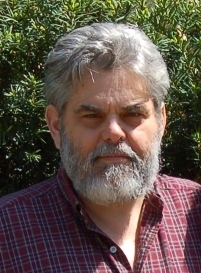 Tom Loudon is the co-director of the Friendship Office of the Americas and former executive secretary of the Commission of Truth in Honduras. He says that following the 2009 coup Honduras has spiraled into becoming the most dangerous country on earth, with much of the violence funded by the U.S. State Department, and with that Department clearly being less than forthcoming with the U.S. Congress or the public.
Tom Loudon is the co-director of the Friendship Office of the Americas and former executive secretary of the Commission of Truth in Honduras. He says that following the 2009 coup Honduras has spiraled into becoming the most dangerous country on earth, with much of the violence funded by the U.S. State Department, and with that Department clearly being less than forthcoming with the U.S. Congress or the public.
Total run time: 29:00
Host: David Swanson.
Producer: David Swanson.
Music by Duke Ellington.
Download or get embed code from Archive or AudioPort or LetsTryDemocracy.
Syndicated by Pacifica Network.
Please encourage your local radio stations to carry this program every week!
Embed on your own site with this code:
<object autostart="false" data="http://davidswanson.org/sites/davidsw..." height="100px" width="400px"></object>
Past Talk Nation Radio shows are all available free and complete at http://davidswanson.org/talknationradio
April 16, 2013
Vieques 10 Years After the Bombing Stopped
By Helen Jaccard and David Swanson, http://warisacrime.org/vieques
Ten years ago May 1, the people of Vieques, Puerto Rico and their supporters from around the world defeated the most powerful military machine ever, through mass civil disobedience and without firing a single shot. On May 1, 2003 the bombing stopped and the bases were officially closed. People from all over the world supported the struggle on Vieques, and the activists and residents have an incredible victory to celebrate.
There were decades of resistance, civil disobedience and arrests. But those hoping and laying the groundwork for greater resistance were given an opportunity on May 19, 1999, when a U.S. Marines pilot missed his target and killed civilian security guard David Sanes Rodriguez. That spark lit a fire of nonviolent resistance that brought together Viequenses, Puerto Ricans, and supporters from the United States and around the world. A campaign of non-violent civil resistance that began in 1999 lasted four years, including a year-long occupation of the bombing range, and saw over 1,500 people arrested. The Navy was forced to close the bombing range on May 1, 2003. Peace loving people had won most of the first of their demands for the island: demilitarization.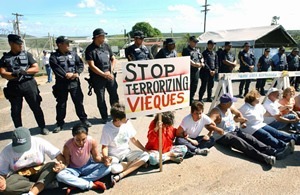
A huge commemoration is planned in Vieques for the anniversary from May 1 – 4, 2013.
Beautiful Vieques island is only 21 miles across and 5 miles wide, and 7 miles from the main island of Puerto Rico. It is home to about 9,300 people, as well as endangered turtle species, rare Caribbean plants and animals, bio-luminescent bays, and miles of what look like unspoiled beaches.
But crabs with three claws, grossly deformed fish laden with heavy metals, once-beautiful coral reefs, and beaches and seas that have been decimated by military activity tell a story of environmental disaster with huge health impacts on people, plants, and animals.
An incredible three-quarters of the island was appropriated in the 1940s and used by the U.S. Navy for bombing practice, war games, and dumping or burning old munitions. This was a terrible attack on an island municipality, one the United States was not at war with.
Now, Vieques Island, a paradise in trouble, is one of the largest superfund sites in the United States, together with its little sister island of Culebra, which took the brunt of the bombing until 1973, when the Culebra bombing range closed (also due to protests) and the bombing practice was transferred to Vieques.
In 2003, the Navy did not return the land to the people, but transferred its Vieques land to the U.S. Fish and Wildlife Service, which operates beaches that were never used for military activities.
Viequenses fear that keeping the U.S. Government in control of their lands could result in future re-militarization of the island. Residents aren't happy that their land has not been returned to them and that they are fined for staying on their land past sunset or collecting crabs -- a mainstay of their historic diet. There are also two military occupations of lands -- a ROTHR radar system and a communications area, and the people want these closed as well. You can add your name to Viequenses' demand for peace here. 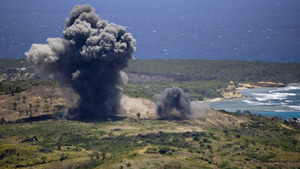
For over 2,000 years people known as Taino inhabited Vieques, which they called Bieque. The Taino found and left behind them a paradise of fertile soil, fresh water, and trees. In 1493, the conquistadors arrived. In 1524, the Spanish killed every remaining resident. Vieques was then left uninhabited by humanity for 300 years, interrupted by a few British, French, and Spanish attempts to set up forts or destroy each other's efforts.
From 1823 into the 1900s, Vieques was used by the Spanish and French to grow sugar. English-speaking people of African origin, from nearby islands, were kept in slavery or the nearest thing to it, and forced to grow the sugar cane. They revolted in 1864 and 1874, and in the 1915 Sugar Strike. The United States took Puerto Rico from the Spanish in 1898 and made residents U.S. citizens in 1917. The depression of the 1930s, together with two hurricanes in 1932, brought on harder times than ever.
In 1939 the United States bought 26,000 of the 30,000 acres of land on Vieques from big sugar plantation owners. Living on that land were 10,000 to 12,000 workers who also raised crops to feed themselves. The U.S. Navy gave families $30 and one day's notice before bulldozing houses. Most people were left without means of subsistence, but many stubbornly refused to leave the island.
Carlos Prieta Ventura, a 51-year-old Viequense fisherman, says his father was 8-years-old in 1941 when the Navy told his family their house would be bulldozed whether or not they accepted the $30. Ventura says he has always resisted the Navy's efforts to force people off the island.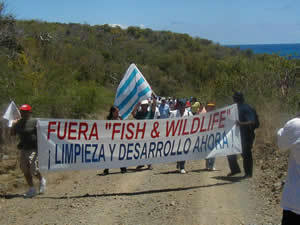
From 1941 to 2003, the U.S. military flew planes from aircraft carriers based on the main island of Puerto Rico dropping bombs over Vieques. Bombs "rained down," and you could feel the ground shake within the base, as one U.S. veteran told CNN. Bombs fell at all hours, all day, all week, all year, amounting to approximately a trillion tons of ordnance, much of which (some 100,000 items) lies unexploded on land and in the sea. Vieques was systematically poisoned by heavy metals, napalm, Agent Orange, depleted uranium, and who knows what all else that the Navy has not announced publicly -- having falsely denied using depleted uranium before finally admitting to it, and having dumped barrels of unknown toxic substances into the clear blue Caribbean.
The arsenic, lead, mercury, cadmium, and aluminum in the bombs are also found in hair samples of 80% of the people living on Vieques, who suffer at far higher rates than on the main island (and possibly anywhere else on earth) from cancer (30% higher than Puerto Rico), cirrhosis of the liver, kidney failure, hypertension (381%), diabetes (41%), birth defects, stillbirths, and miscarriages.
The impact of the U.S. occupation that began in 1941 was felt far more swiftly than cancer. According to Ventura, some 15,000 troops were routinely set loose on Vieques looking for booze and women. Women were dragged out of their homes and gang raped. A boy was killed by gang rape. Ventura says people had only a machete and a hole in the wall by the door where they could try to stab the Marines who would come to take women. A dozen people were killed over the years directly by the U.S. weapons testing. And the Navy banned fishermen from various areas, advising them to try food stamps instead. Fishermen attempted civil resistance actions, and many were arrested during the 1970s, 80s, and 90s.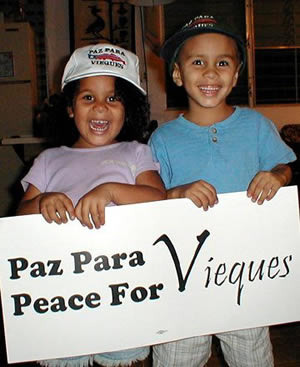
Lydia Ortiz, a Viequense who grew up in the small town of Esperanza, recalls the bombing: "A lot of houses had their roofs falling in and everything as a result of the vibrations from the bombs for many years. It was pretty nerve wracking because you never knew what was going to crash down in your house. We lived quite close to where the bombing was happening. When I was a child they were dropping bombs near me. In the school, you could hear the bombing. You couldn't even hear the teacher because of the noise. People were afraid to go anywhere near the base or the beach so it was very difficult for many years. It seems like just yesterday or only 5 or 6 years ago that the bombing stopped, even though it is really almost 10 years ago."
A celebration of the 10-year anniversary is indeed in order. We must remember victories as they have remarkable power to motivate others around the world.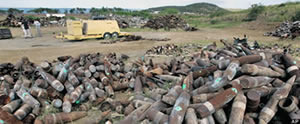
But the Navy's presence and the environmental disaster it created continue to afflict Vieques today. The U.S. government has not cleaned up the poisons and bombs and continues to use practices that further endanger the people. There is no bomb explosion chamber on the island. The United States has disposed of what unexploded bombs it has disposed of by blowing them up, further spreading the contaminants that are killing the people of the island.
There is also no hospital on the island, few ferries to the island, few and overpriced airplanes, a handful of taxis and public vans, and very limited tourist facilities. There is no college or university, and very few jobs of any kind. Business licenses are issued in San Juan and require bribes. Viequenses' families are ravaged by cancer, but also by illiteracy, unemployment, violent crime, and teen pregnancy. All of the water -- like all electricity -- comes in a pipe from the main island. Two of the residents said that the one resort on Vieques sometimes uses all the water. Seven thousand Viequenses sued the U.S. government over their health problems, but the U.S. Supreme court refused to hear the case.
With very little land available for farming, Vieques, like all of Puerto Rico, imports almost all of its food. Some people have become so desperate that they gather old munitions to sell for a little money to someone who will melt the metal for aluminum cans. But heavy metals and depleted uranium endanger the metal gatherers and whoever later drinks from the cans.
Presidential candidate Obama wrote to the Governor of Puerto Rico in 2008: "We will closely monitor the health of the people of Vieques and promote appropriate remedies to health conditions caused by military activities conducted by the U.S. Navy on Vieques." But that promise remains unfulfilled.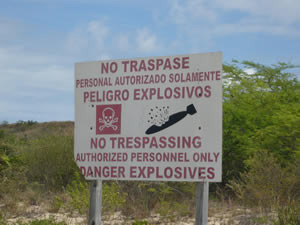
Robert Rabin Siegal of the Committee for the Rescue and Development of Vieques writes in a letter to President Barack Obama,
"Although I cannot claim the Navy and military toxics caused my cancer, you don't have to be a quantum physicist to understand how decades of exposure to heavy metals in the food chain, air, water and land, combined with the socio-economic pressures from the loss of two thirds of the island’s lands, would clearly contribute to high cancer rates. The Navy dropped radioactive uranium projectiles here, we believe, in large quantities, in preparation for military actions in the Balkans and the Middle East. The list of dangerous chemical components from munitions dropped on Vieques is extensive, as is the number of illnesses they cause.
"Mr. President: you received the Nobel Peace Prize; we demand peace for Vieques. An island and people used to protect U.S. interests since WWII, forced to sacrifice its land, economic prosperity, tranquility and health, deserves at least the hope of peace for this and future generations."
". . . A handful of powerful US based corporations have pocketed most of the more than 200 million dollars spent on clean-up over the past decade. We urge you to order technology transference to promote the creation of Puerto Rican and Viequense companies to carry out the clean-up of Vieques, thereby transforming that process into part of the economic reconstruction of the island as well as assuring community confidence in this crucial element in the healing of Vieques."
People anywhere in the world can take one minute to sign a petition to the Pentagon, Congress, and the White House in support of justice, at long last, for Vieques:
"I join the people of Vieques in demanding:
"Health Care -- Provide a modern hospital with cancer treatment facilities, early screening and timely treatment for all diseases. Create a research facility to determine the relationship between military toxins and health. Provide just compensation to people suffering poor health as a result of the Navy's activities.
"Cleanup -- Fund a complete, rapid cleanup of the land and surrounding waters, still littered by thousands of bombs, grenades, napalm, Agent Orange, depleted uranium and other explosives left by the Navy. Cease the ongoing open detonation of unexploded ordnance. Guarantee community participation in the cleanup; train Viequenses as managers, administrators, and scientists, and foster Viequense companies to do the work.
"Sustainable Development -- Support the Master Plan for Sustainable Development of Vieques which promotes agriculture, fishing, eco-tourism, small guest houses, housing, collective transportation, archaeology, and historic and environmental research, among other things.
"Demilitarization and Return of the Land -- Close the remaining military installations still occupying 200 acres of Vieques. Return to the people of Vieques all land still under the control of the U.S. Navy and the federal government."
For extensive documentation, see the attachments at the bottom of http://warisacrime.org/vieques and others at this link.
Helen Jaccard is Chair of the Veterans For Peace -- Environmental Cost of War and Militarism Working Group. She spent October, 2012 in Vieques doing research about the environmental and health effects of the military activities. Her previous article about Sardinia, Italy can be found at http://www.warisacrime.org/sardinia .
David Swanson's books include "War Is A Lie." He blogs at http://davidswanson.org and http://warisacrime.org and works for http://rootsaction.org. He hosts Talk Nation Radio.



